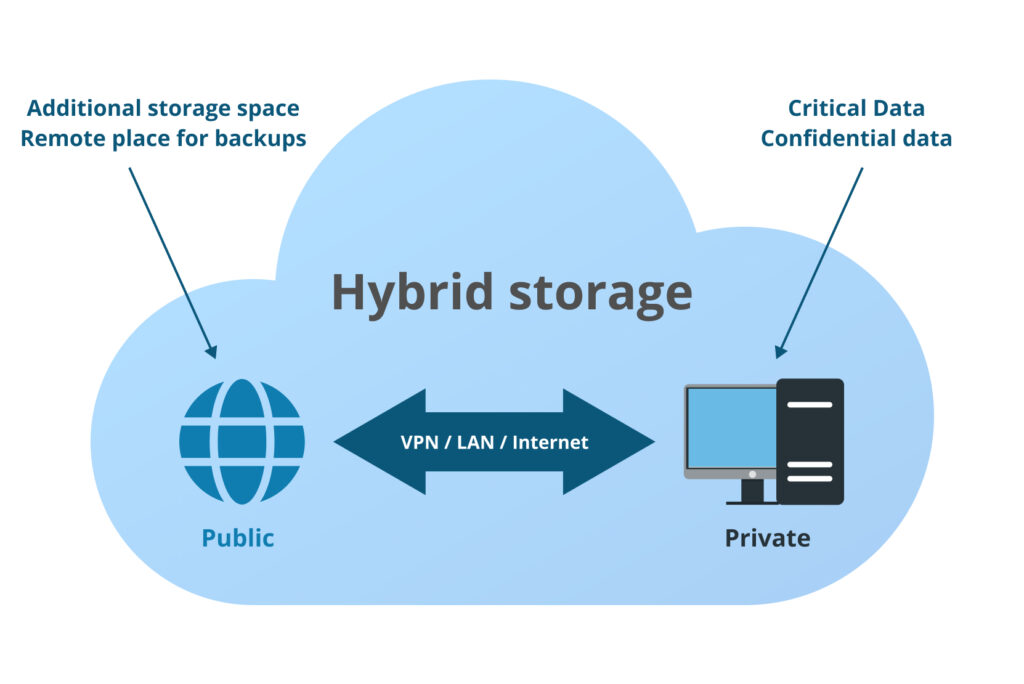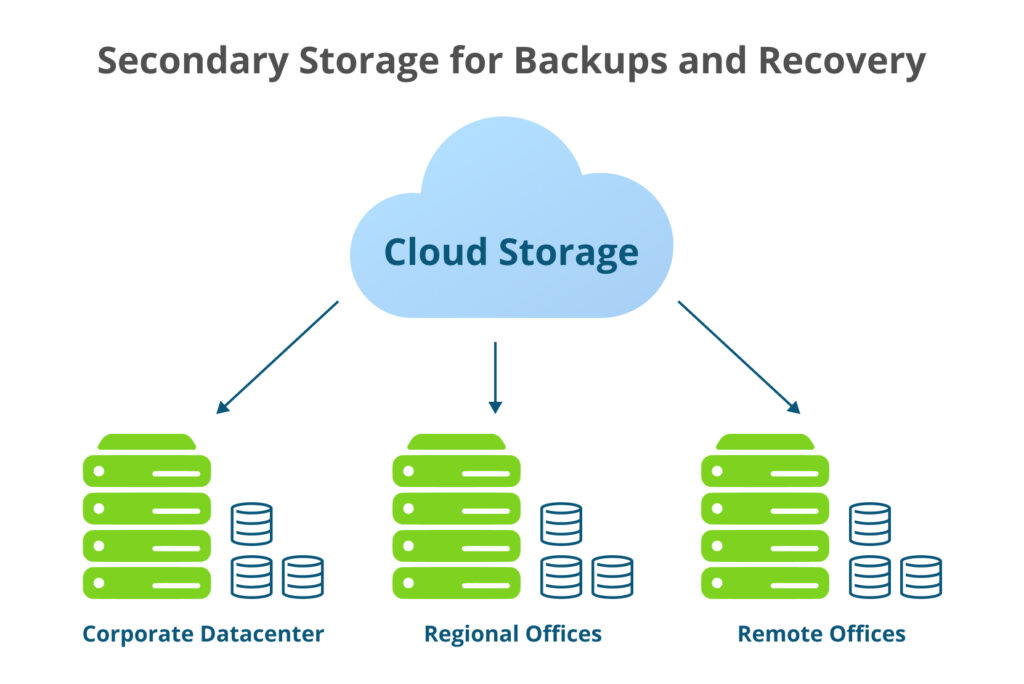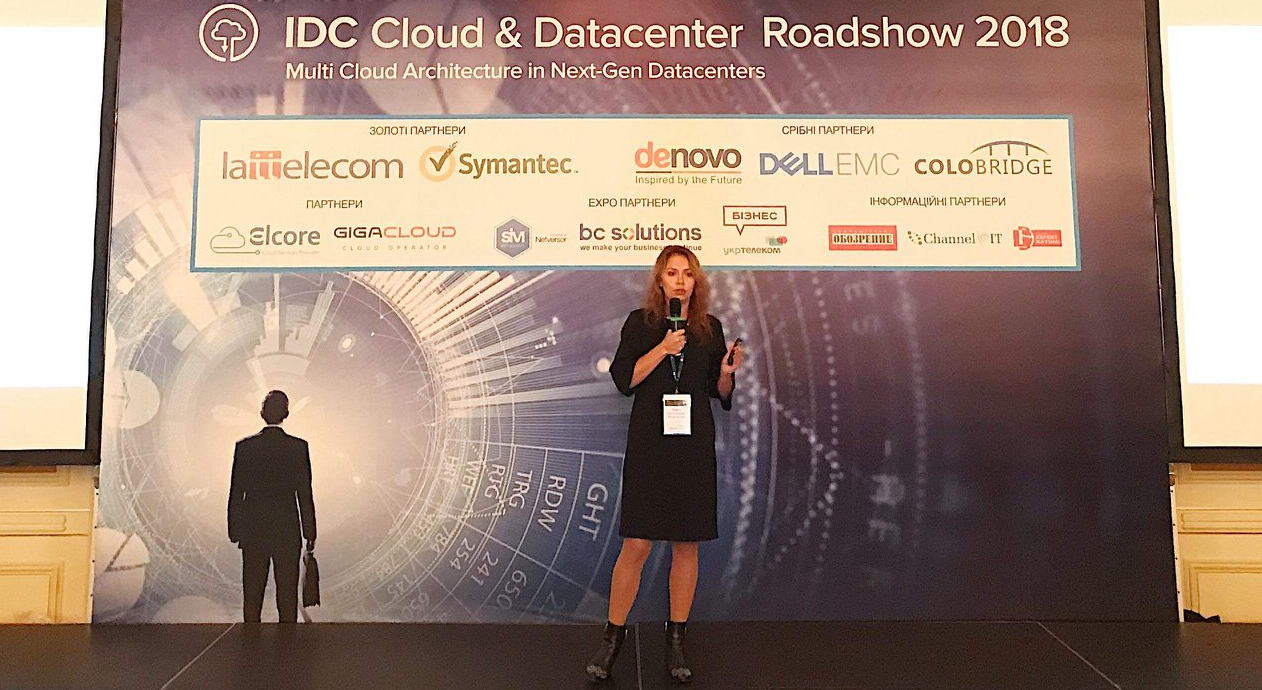Hybrid IT infrastructure enables flexible distribution of workloads between on-premises and cloud computing environments. Such an approach to IT infrastructure management is said to be one of the main trends in cloud computing for the coming year. At the same time, even hybrid data storage itself can significantly benefit the business.
Hybrid cloud storage architecture
Technically, hybrid cloud storage solutions can be built on the basis of local infrastructure and public cloud (IaaS solution) or on the basis of public and private cloud (Private Cloud). Client infrastructure can also be placed in the provider’s data centre (Colocation service). Hybrid approach to data storage does not complicate data management processes, but on the contrary, makes them more transparent, and also makes it possible to better cope with peak loads and force majeure situations.
This is what the concept of hybrid cloud storage looks like:

To make the most of hybrid cloud file storage in certain scenarios, synchronisation is used. If different users are working with the same files and folders simultaneously, it is important to keep data up-to-date so that changes made to one copy of a file appear instantly on another copy. This saves time for data searches, optimises routine data operations, and also reduces errors. At the same time, a company must manually determine which files and folders need to be synchronised because synchronising all the data is cumbersome, costly and insecure.
Colobridge’s Expert:
“The more data a company has and the faster its data volumes grow, the more sense it makes to use a hybrid cloud storage solution. At the very least, it is cheaper both for initial costs and for future maintenance as it is enough just to rent extra storage space instead of buying new local SANs. For those clients who already use the computing capacities provided by Colobridge platform, we provide Block Storage — a reliable, fast and secure SAN storage solution that is easily scalable and enables centralised data storage management.”
Benefits of Hybrid Cloud Storage
When considering Use Cases for Hybrid Cloud Storage Systems, hybrid storage solutions are most commonly used by companies that have their own infrastructure and still need extra cloud storage as they don’t want to invest in scaling up their current SAN because of rapidly growing data volumes and they need to accommodate distributed teams and backup data storage.
How do businesses benefit by using hybrid storage solutions?
- Economic advantage. Hybrid storage helps reduce capital expenditures as the company does not have to invest in buying local storage systems.
- Easy scaling. Cloud storage capacity can be easily changed if there is an increase in the amount of non-critical data that is sensible to store specifically in the cloud.
- Rapid implementation of innovations. The company will be able to reduce costs and accelerate the development and deployment of new applications, hence there is no need to buy new physical SANs to accommodate extra data.
- Accelerating access to data. Some data can be placed as close to end users as possible to improve IT service performance and make sure there are no access delays.
- Business continuity. Numerous use cases for hybrid cloud data storage systems also include hybrid cloud backup solutions. Should an operational failure or natural disaster affect local IT infrastructure, the company will recover data in a short time.
Colobridge expert:
“Quite often it so happens that a client faces a non-operational or partially operational data storage (some components have failed and new ones have not been installed yet), but it is clear that storing data is still necessary; moreover, the data keeps accumulating. In this case, a client will also need hybrid data storage, and he or she can use the provider’s cloud storage for a fall-back period”.
Using hybrid cloud to optimise creating and storing backups:

Hybrid Cloud Storage Management
Hybrid cloud storage or hybrid infrastructure in general can be deployed by the client’s IT Department, by the cloud service provider itself (“Managing Hybrid Cloud Storage”) or by a partner, i.e., a system integrator. The same goes for further maintenance: the company can either do it itself or outsource this task if it does not specialise in IT.
Colobridge will take care of designing, building and further maintaining your hybrid cloud storage. Your data in private or public cloud will be placed on a technology platform based on two independent certified data centres in Germany. Approach our manager to find out more about how to make the best of the opportunities offered by hybrid infrastructure for your business.





